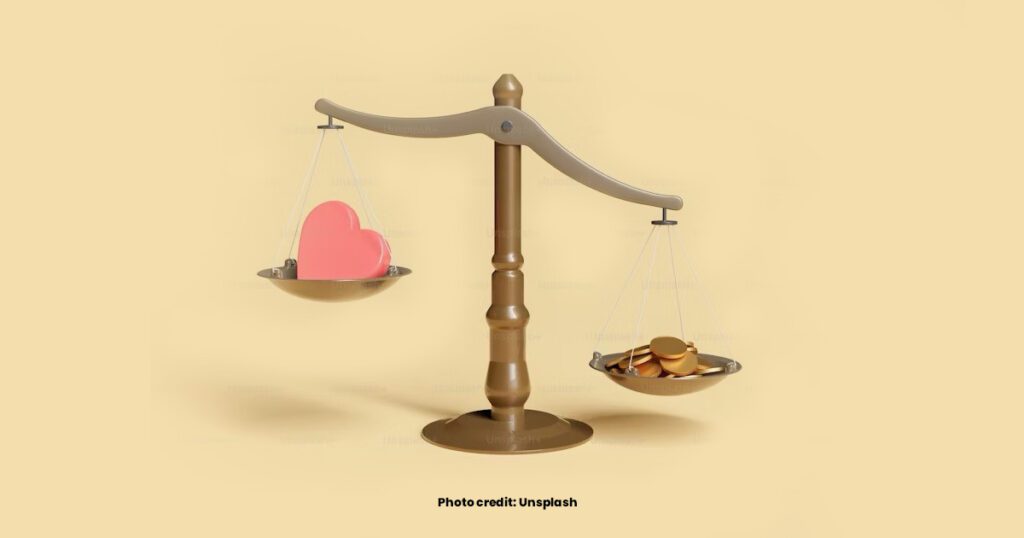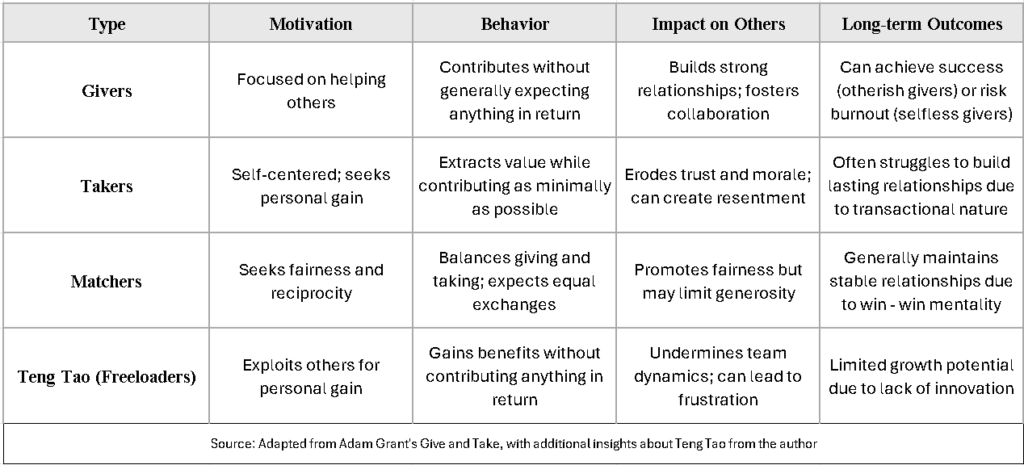
Have you ever encountered a giver, a taker, or a matcher in your business journey? What about someone with a ‘teng tao’ mindset? If this term is new to you, read on, as understanding these dynamics can transform the way you lead and grow your business.
In today’s business landscape, success increasingly depends on our ability to influence and connect with others. Influencing is one of the five key skills of master strategists (source: ‘The Rainmakers,’ Mansmith and Fielders), alongside sensemaking, innovating, discovering, and executing. Recognizing the subtle but impactful behaviors of givers, takers, matchers—concepts popularized by Adam Grant in his book Give and Take—and the lesser-known ‘teng tao’ (freeloaders or exploiters), can redefine how we build strategies, lead teams, and create sustainable value.
This article offers marketing professionals and entrepreneurs a practical framework for navigating these behaviors to drive growth, collaboration, and long-term success.
Redefining Value Creation Through Interaction
1. Givers: The Value Creators
Givers focus on creating value for others. Their customer-centric approach goes beyond transactions, building deep, genuine connections that resonate with both stakeholders and communities.
Those who practice “smart giving”—balancing their own needs while helping others—tend to thrive, whereas overly self-sacrificing givers might struggle professionally. This dual outcome is a key insight in Grant’s framework.
Unilever’s ‘Sustainable Living Plan’ exemplifies a giver mentality by aiming to reduce the company’s environmental impact while improving the health and well-being of communities worldwide This initiative is more than just a business strategy—it’s a commitment to societal progress, showing that true value creation extends beyond selling products to making a meaningful difference.
By prioritizing long-term relationships over short-term gains, you can build a brand that stands the test of time.
2. Takers: The Short-Term Gain Seekers
Takers are individuals who prioritize their own gain, often at the expense of others, and typically contribute the bare minimum to group efforts. They strategically employ various tactics to extract maximum value from suppliers, customers, or colleagues to achieve their personal goals.
A common example of a taker strategy is when a company bundles freebies with overpriced products to create an illusion of value. This tactic might entice quick purchases, but it leaves customers feeling misled once they realize they’ve overpaid. Such practices can cause long-term damage to brand reputation and customer trust, exemplifying the self-serving nature of a taker approach that prioritizes profit over genuine customer satisfaction and long-term loyalty.
Sustainable success is built on transparency, accountability and strong relationships. Avoid strategies that sacrifice integrity for short-term wins, as they not only erode brand credibility but also create lingering resentment.
3. Matchers: The Pragmatic Balancers
Matchers operate on the principle of reciprocity, seeking balanced exchanges where both parties benefit. This approach fosters fairness and mutual respect in business relationships.
Dropbox’s referral program is an example of matcher behavior. By rewarding both the referrer and the new customer with additional storage, Dropbox created a win-win scenario that fueled rapid user growth while strengthening customer engagement.
Create initiatives that encourage mutual benefits. When your business actions align with a sense of fairness, you build trust, and your customers are more likely to become your advocates.
4. Teng Tao: The Silent Opportunist
’Teng tao’ is a Chinese term that describes individuals or businesses that seek to gain benefits without putting in the corresponding effort or any sense of responsibility. These silent opportunists exploit others’ hard work without making any meaningful contributions of their own, showing little concern for reciprocity or fairness. The Chinese character for Teng Tao (腾套) has two words: Teng means ‘to soar,’ and Tao means ‘to trap.’ Together, they literally convey the idea of exploiting others in order to soar.
Corporate cloners exemplify the teng tao mindset as they exploit others’ innovations without contributing original value or fairly compensating the creators. By letting others take on the initial risks and validate concepts, cloners minimize their own investment and gain a shortcut to market entry. However, because they lack the innovation mindset—relying instead on copying—this approach often stalls them in the long term.
Foster a culture of transparency and accountability in your organization. Ensure that each team member’s contributions are visible and valued. This discourages passive opportunism and reinforces a collective commitment to innovation and excellence.
The Difference Between Takers and Teng Tao
While both takers and teng tao prioritize personal gain, their methods differ significantly. Takers often openly manipulate situations to their advantage, whereas teng tao personalities work quietly, exploiting opportunities without drawing attention to their lack of effort.
Build a culture that values transparency and rewards effort. By recognizing and celebrating genuine contributions, you make it difficult for teng tao behavior to thrive, turning passive opportunism into active participation.
A Cross-Cultural Perspective on ‘Teng Tao’
The concept of ‘teng tao’ has its roots in Chinese culture, where it originally referred to individuals who benefited from others without contributing their fair share. In today’s global business environment, this mindset can manifest in various ways, from corporate free riders to opportunistic competitors. Understanding this behavior not only provides a deeper cultural insight but also equips business leaders with the tools to address it in their own organizations.
Summary
Here’s a comparative chart summarizing the characteristics of Givers, Takers, Matchers, and Teng Tao (freeloaders):

Humans naturally possess a tendency to reciprocate, but givers, takers, and even teng tao exemplify the extremes of this behavior. Givers who are strategic in their generosity, often referred to as “otherish givers,” stand in contrast to selfless givers. They possess the ability to navigate interactions with takers and matchers effectively, ensuring that they are not taken advantage of. This smart mindset allows them to maintain healthy relationships while still contributing positively to their organizations.
Understanding the dynamics of givers, takers, matchers, and teng tao is not just beneficial—it’s essential for any business leader aiming to build a high-performing organization. It not only helps identify and manage these behaviors but also provides a strategic pathway to fostering a more engaged, innovative, and loyal workforce.
I challenge each entrepreneur, and marketer reading this to reflect on their approach: Are you a giver, taker, matcher, or do you have a teng tao mindset? Are you nurturing a culture that celebrates givers and matchers while curbing the impact of takers and teng tao? Are you ready to innovate not just in your products but in your leadership and team dynamics?
Your answers to these questions will determine whether your business leads in value creation or gets lost in the noise of those chasing short-term gains. By embracing these principles, you can turn every interaction into an opportunity and transform challenges into catalysts for sustainable growth.
***
Josiah Go is the chair and chief innovation strategist of Mansmith and Fielders Inc. Their book Entrepreneurship: The Four-Gate Model (by Josiah Go, Chiqui Escareal-Go, and Calel Gosingtian), officially endorsed by Go Negosyo and JCI Manila, is currently no. 1 in entrepreneurship books, no. 1 in business books, no. 1 non-fiction books, and is available at all branches and online stores of National Book Store nationwide.

